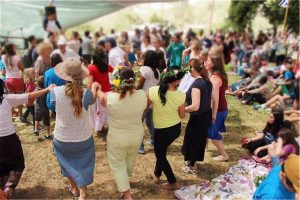The current condition of the State of Israel is nothing short of miraculous. One hundred years ago, this country was largely barren swamplands and deserts, with roughly 900,000 inhabitants, 9% of whom were Jews (according to Ottoman statistics studied by Justin McCarthy). Today, Israel’s cities are large, bustling, and growing bigger and bigger by the day. There are currently over 8 million inhabitants, 75% of whom are Jewish. In addition to its growing population, Israel is consistently at the forefront of new inventions, technology, and scientific discoveries.
Most exciting of all, it is the fulfillment of God-given prophecy—of promises the Lord made to his chosen people through the mouths of his prophets thousands of years ago. The Lord promised that after exiling them from their land and scattering them among the nations, he would gather his chosen people from the north, the south, the east, and the west (Isa 43:5–6; Ezek 37:21; Jer 31:7–10)—and he has! He promised that the desert would blossom like a rose (Isa 35:1) and that there would be a road in the wilderness and streams in the desert (Isa 43:19).
chosen people through the mouths of his prophets thousands of years ago. The Lord promised that after exiling them from their land and scattering them among the nations, he would gather his chosen people from the north, the south, the east, and the west (Isa 43:5–6; Ezek 37:21; Jer 31:7–10)—and he has! He promised that the desert would blossom like a rose (Isa 35:1) and that there would be a road in the wilderness and streams in the desert (Isa 43:19).
The restoration of Jews to the land of Israel began in 1881 with the First Aliyah, which consisted primarily of brave, ideological Jews fleeing the pogroms of Eastern Europe. By 1924 (the Fourth Aliyah), Jews living in Middle Eastern countries—Iraq, Iran, and Yemen—had begun to immigrate as well. These were followed by more European Jews (around the time of the Holocaust), by more Middle Eastern Jews, and then by North African Jews in the 1950s. The past few decades have seen Iranian Jews, Russian Jews, Ethiopian Jews, Latin American Jews, and, most recently, French Jews make aliyah in droves. In addition to these, a small, steady stream of North American Jews has been making aliyah since 1948. All this is the fulfillment of God’s prophecies by his own hand!
Among this influx of Jews from all over the world, many Messianic Jews have come to Israel. While Messianic Jews still do not make up a large percentage of the population, the Messianic movement in Israel is also continually growing. This growth is, in large part, the result of believers making aliyah.
In recent years, the Messianic movement here has flourished and blossomed in much the same way the state has. Today, you can find one or more congregations and/or home groups in almost every city. Various organizations and congregations organize conferences and camps for children and youth at regular intervals. There is a Messianic training program to prepare believing youths for their army service and an in-depth Bible course for young people after their army service. There are various conferences for young adults. There is an Israeli Bible college. There are prayer conferences. There are music conferences for composers of worship songs. There are conferences for men and conferences for  women. There is a variety of Messianic organizations (e.g. anti-abortion organizations, Messianic publishing houses, bookstores). There is so much going on in the Messianic movement in Israel today that events coincide, so it’s not even physically possible to participate in everything (at least, not until Israelis invent the technology!).
women. There is a variety of Messianic organizations (e.g. anti-abortion organizations, Messianic publishing houses, bookstores). There is so much going on in the Messianic movement in Israel today that events coincide, so it’s not even physically possible to participate in everything (at least, not until Israelis invent the technology!).
One of the challenges of being a Messianic Jew in Israel is the fear of other Jews’ reactions when told about the faith. This fear of rejection is spiritual intimidation from the enemy. Sadly, it is common to many Messianic believers in Israel. However, once this fear is overcome, the response of many secular Israelis, and even some religious Jews, upon being told of the Messianic faith is to smile and say
“interesting!” or “cool!” The most feared reaction (anger, disgust, or disapproval) rarely makes an appearance, though it does happen on rare occasions. It helps that the Messianic movement here in Israel is characterized by strong—not lukewarm—believers. As a result, upon sharing their faith with
non-believers, many Messianic Jews discover that other Messianics before them have already been a wonderful testimony in those non-believers’ lives.
Because there’s so much support for believers in various forms (conferences, groups, congregations), it’s easier to share the gospel with others. As a result of the children’s and youth camps, these young people are empowered to share their faith at school and with their friends. While some intimidation still remains and causes some believers to fear persecution for their faith, as a movement we’re overcoming it and reaping the results of having others become interested in our faith.
Despite the occasional attempts to derail her, Israel is going strong, as is the Israeli Messianic movement. If there was ever a time for Messianic Jews to make aliyah, this is it.